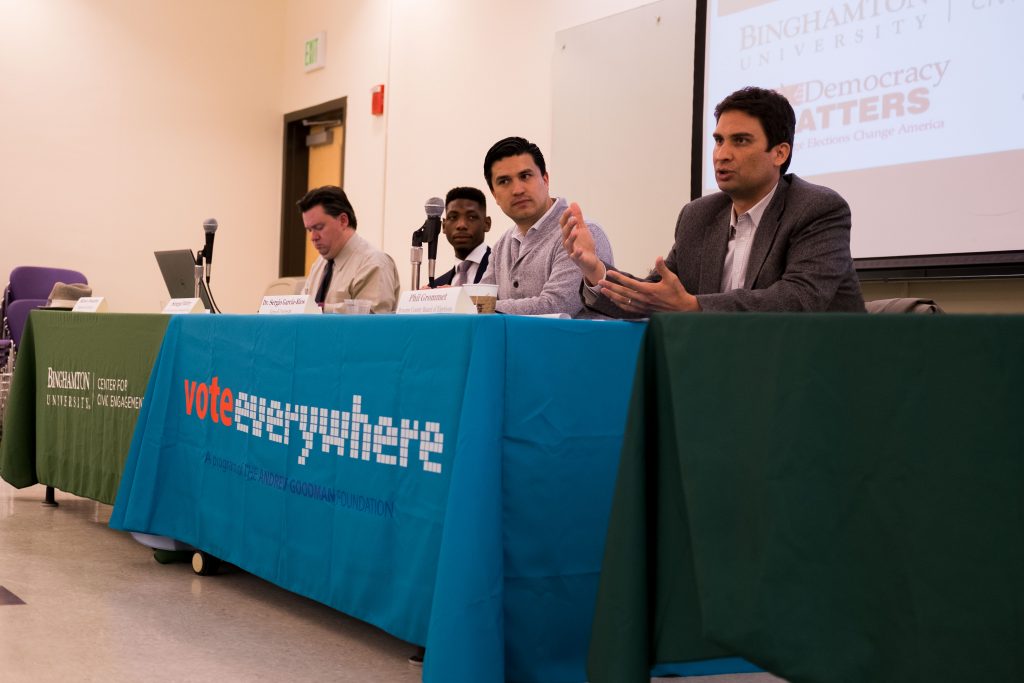
Binghamton University was a designated polling center for students on campus this past November, but only about 300 of the 7,000 students who live on campus voted.
Democracy Matters and the Center for Civic Engagement (CCE) partnered to host Passion to Action: Democratic Access, a panel aiming to educate and encourage student voters.
The event, held in the University Union last Thursday, featured panelists Shawn Donahue, a third-year graduate student studying political science; Sergio Garcia-Rios, assistant professor of government and Latino studies at Cornell University; Phil Grommet, democratic election commissioner of the Broome County Board of Elections; and Senegal Mabry, president of the Binghamton division of the New York Public Interest Research Group and a junior majoring in political science.
The panelists were asked a series of questions that touched on topics like voter registration, national low voter turnout and voting barriers for minorities, with each panelist drawing on their area of expertise to answer the queries. The event focused on posing solutions to the lack of voter engagement on campus in preparation for the upcoming midterm elections in November 2018.
“We’re in one of the few seats that is a toss-up,” Donahue said. “These votes can help decide if there will be a democratic or republican Congress.”
He pointed to the 2016 presidential election as an example of the importance of the student vote.
“New Hampshire was decided by a very small margin because students from other northeast states went to school there, but voted in their hometowns instead,” Donahue said.
As election commissioner, Grommet’s job includes processing voter applications, overseeing and administering elections and placing names on ballots. He said he hopes to continue making voting accessible for students at BU.
“We want to ensure that we don’t put up unnecessary barriers to students regarding voting,” Grommet said. “I’m very proud that we have voting on campus and I want to make sure that continues.”
Mabry also emphasized the importance of students feeling invested in the community, and said a lack of belonging could be contributing to low voter turnouts on campus.
“If you don’t care about the community, why would you register to vote if you’re only here for four years?” Mabry said. “To that, organizations like [New York Public Interest Research Group] make people aware of recent elections — for example, there was a recent mayoral election. We ask, are you sure you don’t want to have a say in that? Locally, you can make a difference.”
Student presentations followed the panel. Brianna Cea, a junior double-majoring in political science and philosophy, politics and law and the Southern Tier district leader for the Let New York Vote coalition, said she thinks the state’s voting laws are antiquated. Cea encouraged reform throughout her presentation.
“It’s important to educate students at [BU] about democratic access because of our state senator being the chair of the elections committee,” Cea said. “There is a lot of potential for voting reform this legislative session. Call state Sen. [Fred] Akshar. Tell him to support early voting in this legislative session.”
According to Ferdous Dehqan, Vote Everywhere ambassador for the Andrew Goodman Foundation at BU and a senior majoring in political science, plans for future events like this one are in the works.
“We are going to have a follow-up event for this event to really make sure that the students are more aware of their voting rights,” Dehqan said. “We also want students to understand the importance of reaching out to their legislators and representatives. That is the most important thing.”


